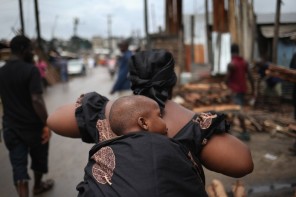The Liberian Truth and Reconciliation Commission doesn’t quite say yes…but it does say that perhaps the much-lauded president of the new Liberia has more to answer for than she necessarily admits. In today’s TIME.com, Glenna Gordon writes:
In its final report, released yesterday, Liberia’s Truth and Reconciliation Commission (TRC), a body modeled on South Africa’s historic truth commission, says Johnson Sirleaf should be banned from government for 30 years for her early support of former Liberian President Charles Taylor.
Ah, but it’s complicated:
But in a conflict that went on for nearly two decades, it’s hard to find any Liberian officials whose hands are completely clean. When she testified at the TRC, Johnson Sirleaf admitted that during the early years of the war she had brought food, supplies and financial assistance to Taylor. At the time, she said, she wanted to see an end to the repressive and tyrannical regime of President Samuel Doe. If she cast her lot with a war criminal, she said, she did so unwittingly.
Check out the full story.




Is Ellen Johnson-Sirleaf a war criminal? Well, Ellen herself knows the answer.
She knows the answer is found within the TRC Report.
The interest of Liberia is at stake right now. To protect the interests of the State and guide against inappropriate behavior on the part of these individuals, particularly as it relates to contractual agreements; we propose that a select group of upstanding citizens be empanelled at the soonest for the purpose of overseeing and approving all major contracts as well as long-term commitments involving the Republic.
The Liberian people are calling upon the international community, particularly the United States, to support the will of the Liberian people as expressed in the TRC report. And that funds and expertise are made available for the ‘Extraordinary Criminal Tribunal for Liberia’ to ensure the proceedings are fair, swift and just.
It must be noted, Madam Ellen Johnson Sirleaf as well as the vast majority of affected persons voted overwhelmingly for the Truth telling process; now they must comply with these recommendations. No longer must they be allowed to threaten the peace, security and stability of Liberia and the Sub-region at large.
The Truth and Reconciliation Commission of Liberia (TRC) was established at the end of the peace conference in Accra, Ghana when the Comprehensive Peace Agreement (CPA) was signed by all parties to the conflict including the international community, in August 2003. Under the CPA President Charles Taylor left office and went into exile, paving the way for a two year Liberia National Transitional Government headed by Chairman Gyude Bryant. In June 2005, the National Transitional Legislative Assembly enacted the TRC Act into law. National Elections were held in November 2005. President Ellen Johnson Sirleaf inaugurated the nine-member Commission in February 2006.